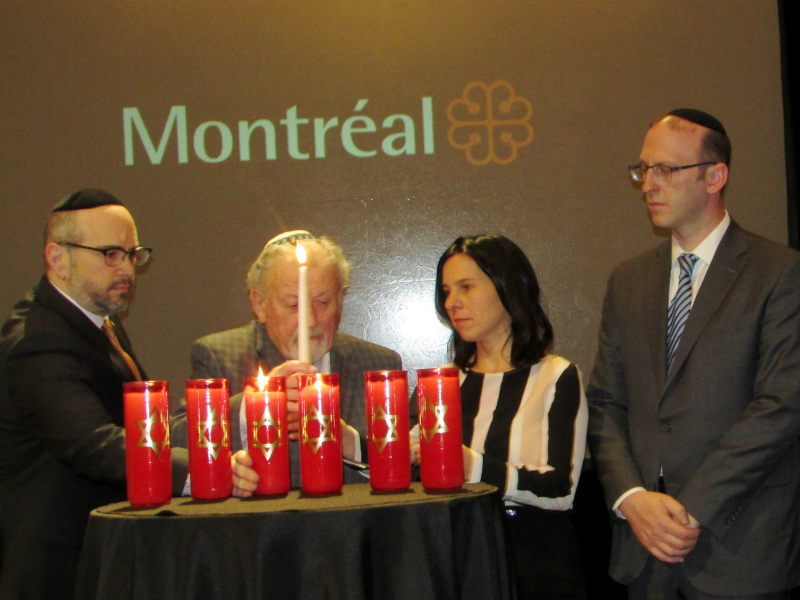Montreal Mayor Valérie Plante stressed the importance of Holocaust remembrance, both to honour those who perished and to combat racism today, at the city’s commemoration of Yom ha-Shoah at city hall on May 1.
“The duty of remembrance is essential to making us reflect collectively about the dangers that are posed by hatred and intolerance,” said Plante.
She warned against indifference: despite countless warnings to the international community about what was happening to Jews in Europe, they were not taken seriously for a long time, she said, and two-thirds of the population was annihilated.
“Today, it seems unthinkable that so much evidence was ignored for so many years,” she said. But, thanks to the work of the Montreal Holocaust Museum (MHM), it is now understood that “an ignominy of such magnitude began with gestures of exclusion that rapidly turned into the absolute horror, in dozens of territories.”
Though the “enormity” of the Holocaust may defy comprehension, Plante said that, “We must not turn away in the face of such acts of inhumanity, but instead we must learn from them.… To remember the Holocaust is to act in favour of a more just society.”
Youth in particular must hear the stories of Holocaust survivors, Plante said. She also believes that countering discrimination begins at home. “Montreal is a great city because of its diversity,” she said. “Openness and tolerance are among the core values we uphold.”
She reiterated that regardless of “whatever God we believe in,” we all share a common humanity and “we must stand strong against those who might bring other messages.”
READ: MORE THAN HALF OF CANADIANS DON’T KNOW SIX MILLION JEWS DIED IN HOLOCAUST: POLL
This was the first time Plante has participated in the Yom ha-Shoah commemoration, which began with the previous administration. She was unable to attend last year.
Plante seemed especially touched by the testimony given by Fishel Goldig, who, as a child, survived the Nazi onslaught in his native Ukraine. He has for many years spoken to students as a MHM volunteer.
The atrocities he witnessed, including the murder of his aunt and eight-year-old cousin, still haunt him at 85.
After escaping the ghetto, Goldig and his parents and other relatives survived the last two years of the war literally underground, in a bunker dug on the property of a farming family who were later recognized as Righteous Among the Nations by Yad Vashem.
Goldig said it must be remembered that 1.5 million victims of the Holocaust were children. His survival was “pure luck,” and he has felt an obligation to bear witness to what happened. For him, “Never Again is a sacred promise.”
Also present was survivor Léon Celemencki, who was born in Belfort, France, in 1940. His mother was deported to Auschwitz, where she died, and he and his two siblings were split up and sent to orphanages.
A touching moment was the lighting of the six memorial candles. As Plante, Fishel and others took part, Outremont borough Coun. Mindy Pollak and Magda Popeanu, the vice-president of the city’s executive committee, read the names of Jews who perished.
Lionel Perez, the leader of the official opposition Ensemble Montréal, who is Jewish, said the Holocaust did not begin with gas chambers, but with the “social acceptability” of anti-Semitism, which has not disappeared.
The deadly synagogue shootings in Pittsburgh and Poway, Calif., “are painful reminders that we still need to confront” this hatred and ignorance through education, he said.
Israeli Consul General for Quebec & Atlantic Canada David Levy said educating youth has taken on greater urgency with the number of survivors diminishing.
Awareness of the Holocaust is already waning, he said, citing a recent survey, which showed that more than half of Canadians don’t know that six million Jews died in it.
Rabbi Adam Scheier of Congregation Shaar Hashomayim acknowledged that it is almost impossible for anyone to truly comprehend the Holocaust. And although the phrase “Never Again” is affirmed each year, he thinks it is not really believed. That’s why the Jewish community “spends millions of dollars securing its institutions,” he said.
But Jews, including survivors who lost everything, never relinquished hope, he continued. “Despite everything that was done to them, and is being done to them, somehow Jews still say, am Yisra’el chai.”
A short video made by the MHM was screened, which documented Goldig, Celemencki and other survivors speaking to students at Dawson College and Collège Trinité, a high school in St-Bruno. It also featured interviews with young people who described the impact the talks had on them.
Another community-wide Yom ha-Shoah commemoration was held by the MHM at Congregation Tifereth Beth David Jerusalem before a capacity audience. It featured videotaped testimonies from six survivors and a musical portion featuring Goldig, a trained cantor, accompanied by a choir from the Jewish People’s and Peretz Schools.
Only Israel and New York received more survivors after the war than Montreal. The MHM estimates that 4,000 still live here.
The day before, D’Arcy McGee MNA David Birnbaum, wearing a kippah, rose in the national assembly to mark Yom ha-Shoah, which has been officially observed by the legislature since 1999, when his predecessor, Lawrence Bergman, introduced a motion to the effect.
“It was especially poignant to do so in the presence of five survivors, part of a delegation from the MHM,” Birnbaum said. “The occasion marked both the 40th anniversary of the museum and the 20th of the law’s adoption.”
